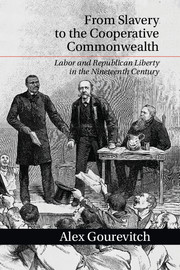Book contents
2 - “Independent Laborers by Voluntary Contract”
The Laissez-Faire Republican Turn
Published online by Cambridge University Press: 05 December 2014
Summary
Where are the slave auction-blocks ... the slave-yokes and fetters ...
They are all gone! From chattels to human beings.... Freedmen at work
as independent laborers by voluntary contract!
William Lloyd Garrison
It was 1869. The Civil War was over and Congress had ratified the Thirteenth and Fourteenth Amendments to the American Constitution, which abolished slavery and guaranteed equal protection of the laws. William Lloyd Garrison’s debates with working men and national reformers were long behind him. He could finally consider his life’s work accomplished. Surveying the new economy, he exulted that he saw nothing but “independent laborers by voluntary contract.” It was a telling turn of phrase – “independent ... by contract.” Although in the last chapter we saw how Garrison opposed his abolitionist theory of freedom to the republican emphasis on independence, in this later utterance we see a blurring of the lines. Now, for Garrison, the absence of interference with voluntary agreements just was independence.
Garrison might not have been running these ideas together intentionally, but it was an important feature of the postbellum ideological atmosphere. As the “labor crisis” took center stage, it became increasingly common to find economists, legal theorists, employers, and public officials arguing that wage-labor was free labor because legal self-ownership was enough to guarantee a person’s economic independence. If the wage-laborer was legally “sui iuris,” or under his own power, then that was enough to know he was independent. Legal status described economic condition. The abolition of slavery and the universal guarantee of freedom of contract eliminated chattel slavery and secured legal protection against becoming subject to any particular employer’s will. Nobody could be forced to work for anyone else; each chose his employer voluntarily. This chapter reconstructs this view because it was the hegemonic idea against which labor republicans would react. This reconstruction is also important because it reminds us that the purity of two ideological traditions, represented in scholarly statements like “we have inherited two rival and incommensurable theories of negative liberty,” is difficult to maintain. In fact, laissez-faire ideas arose not so much by negating the republican theory as by incorporating it into liberal thinking and practice.
- Type
- Chapter
- Information
- From Slavery to the Cooperative CommonwealthLabor and Republican Liberty in the Nineteenth Century, pp. 47 - 66Publisher: Cambridge University PressPrint publication year: 2014

